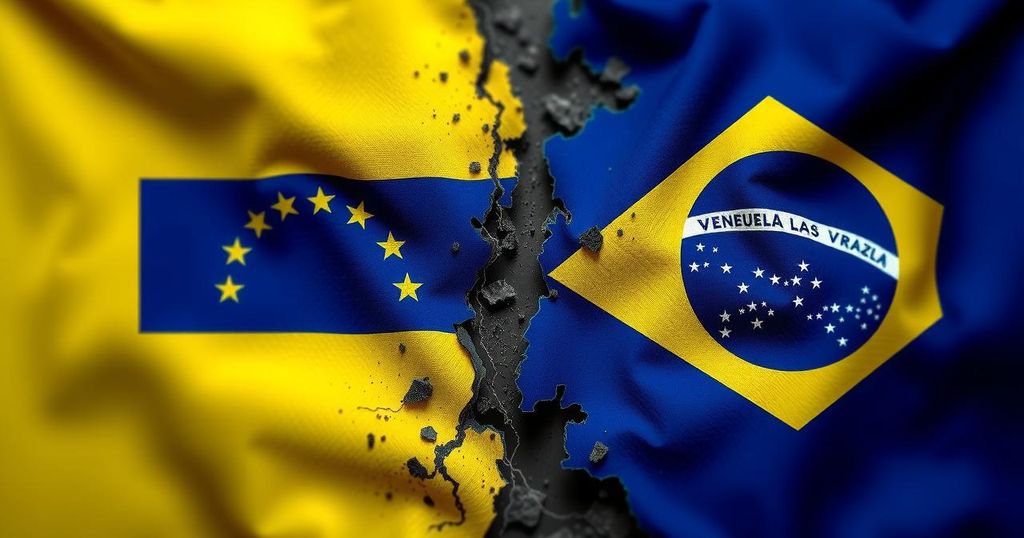Venezuela has escalated its criticisms of Brazil following Brazil’s refusal to support Venezuela’s bid for BRICS membership. The tensions stem from disputes over the legitimacy of Venezuela’s July 2023 presidential election, with accusations of American interference by Venezuelan officials and Brazil’s calls for election transparency. Brazil’s foreign adviser emphasized that Venezuela currently does not meet the necessary conditions for inclusion in BRICS, intensifying the diplomatic rift.
On Wednesday, Venezuelan authorities intensified their criticisms of the Brazilian government, accusing it of jeopardizing bilateral diplomatic relations due to its perceived alignment with U.S. interests. This escalation follows Brazil’s refusal to endorse Venezuela’s candidacy for inclusion in the BRICS coalition of emerging economies, during a recent summit in Russia. This rejection compounds existing tensions linked to Venezuela’s contentious July presidential elections, where Brazil and other nations have sought greater electoral transparency. Venezuela’s Foreign Relations Ministry issued a statement condemning Brazilian officials, specifically targeting Celso Amorim, a key foreign policy adviser and former foreign affairs minister of Brazil. The ministry alleged that Amorim acts as a “messenger of American imperialism,” making inappropriate evaluations of Venezuelan democracy and its institutions. The ministry summoned Breno Hermann, Brazil’s chargé d’affaires in Venezuela, to communicate their strong objections to Brazil’s actions. Amorim, during a parliamentary hearing, recognized the tension arising from Venezuela’s failure to disclose comprehensive election results amidst claims by opposition factions of widespread irregularities in favor of President Nicolás Maduro. Subsequently, he indicated that diplomatic ties could improve but did not elaborate on potential steps Venezuela could take to mend relations. Venezuela’s electoral authorities have cited cyberattacks as the reason for the lack of detailed election results, while opposition leaders have claimed their candidate, Edmundo González, secured a decisive victory based on independently collected vote tallies from the majority of voting machines. In a bid to mediate the crisis, regional leaders including Brazil’s President Luiz Inacio Lula da Silva and Colombian President Gustavo Petro engaged with the situation without yielding any tangible results, and Maduro has since reinforced his grip on power through Cabinet reshuffles and crackdowns on dissent. Brazil’s decision to exclude Venezuela from the BRICS reflects its strategic considerations. Brazil’s Foreign Minister stated that an indefinite expansion of the bloc is not desirable, and that member inclusion should be based on the capacity to represent regional interests. Brazil’s conclusion that Venezuela does not meet these qualifications was made clear, asserting a consensus-driven approach to admissions into the bloc.
The tensions between Venezuela and Brazil have been escalating due to Brazil’s resistance to Venezuela’s entry into the BRICS alliance, coupled with disputes regarding Venezuela’s recent presidential election credibility. The BRICS group, originally founded by Brazil, Russia, India, China, and South Africa, has seen an expansion to include several new members, but Brazil has expressed concerns over Venezuela’s political stability and its ability to contribute meaningfully to the coalition. The ongoing friction is not only a diplomatic issue but also reflects broader geopolitical dynamics in which U.S. influence and regional politics play significant roles.
In summary, the ongoing diplomatic friction between Venezuela and Brazil underscores a complex interplay of regional politics and international influences. Brazil’s rejection of Venezuela’s entry into the BRICS coalition is symptomatic of deeper tensions linked to election legitimacy and bilateral relations. The Venezuelan government’s accusations against Brazil highlight the fragile nature of diplomatic ties in the face of regional instability and external influences. The situation remains dynamic, as both nations navigate their political landscapes amidst escalating confrontations.
Original Source: apnews.com






